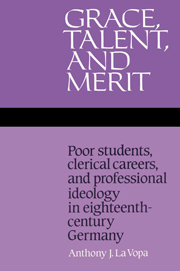 Grace, Talent, and Merit
Grace, Talent, and Merit Book contents
- Frontmatter
- Contents
- Acknowledgments
- Introduction
- PART I POOR STUDENTS
- PART II CALLING, VOCATION, AND SERVICE
- PART III NEW DEPARTURES
- 9 Orthodoxies and new idioms
- 10 Professional ideologies: the making of a teaching corps
- 11 The clerical identity
- 12 Radical visions: Johann Gottlieb Fichte
- Epilogue
- Bibliographical note
- Index
9 - Orthodoxies and new idioms
Published online by Cambridge University Press: 26 March 2010
- Frontmatter
- Contents
- Acknowledgments
- Introduction
- PART I POOR STUDENTS
- PART II CALLING, VOCATION, AND SERVICE
- PART III NEW DEPARTURES
- 9 Orthodoxies and new idioms
- 10 Professional ideologies: the making of a teaching corps
- 11 The clerical identity
- 12 Radical visions: Johann Gottlieb Fichte
- Epilogue
- Bibliographical note
- Index
Summary
Friedrich Gedike's career was eclipsed as rapidly as it had soared. In 1788, just a few years after the celebration of Prussian “freedom” in the Berlin “letters,” Johann Christoph Woellner, the royal favorite who replaced Baron von Zedlitz, launched a crackdown on the “enlightened” party. Though one of the most exposed targets, Gedike kept his offices until his early death in 1803. But survival had required that he steer clear of his elders' protests against Woellner's notorious edicts and that he give up the coeditorship of the Berlinische Monatsschrift in 1790.
This jolting change of course in Prussia was only one of the reactions against Enlightenment rationalism at the end of the century. To a protoconservative like Woellner, Gedike's generation of reformers seemed bent on destroying sacrosanct traditions; but the same men, despite their youth, seemed wedded to a dessicated orthodoxy in the light of the fusion of Kantianism, Idealist philosophy, and classicism that has come to be called neohumanism. It was “self-cultivation” (Bildung) in the neohumanistic sense that would inspire the creation of the nineteenth-century gymnasium and university and would become the badge of membership in a modern Bildungsbürgertum.
The new ideal of Bildung was a secular recasting of calling, self-consciously pagan in its introspection, as well as a quasi-religious reaffirmation of work discipline in vocation. Within this many-sided ideological prism, emancipatory and restrictive impulses, egalitarian and elitist preferences coexisted; and the refractions formed a particularly complex pattern as they projected onto the social structure and experience of academic mobility. It was above all in the implications for poor students, and particularly for outsiders, that Bildung, from one angle, offered a radical alternative.
- Type
- Chapter
- Information
- Grace, Talent, and MeritPoor Students, Clerical Careers, and Professional Ideology in Eighteenth-Century Germany, pp. 249 - 286Publisher: Cambridge University PressPrint publication year: 1988
